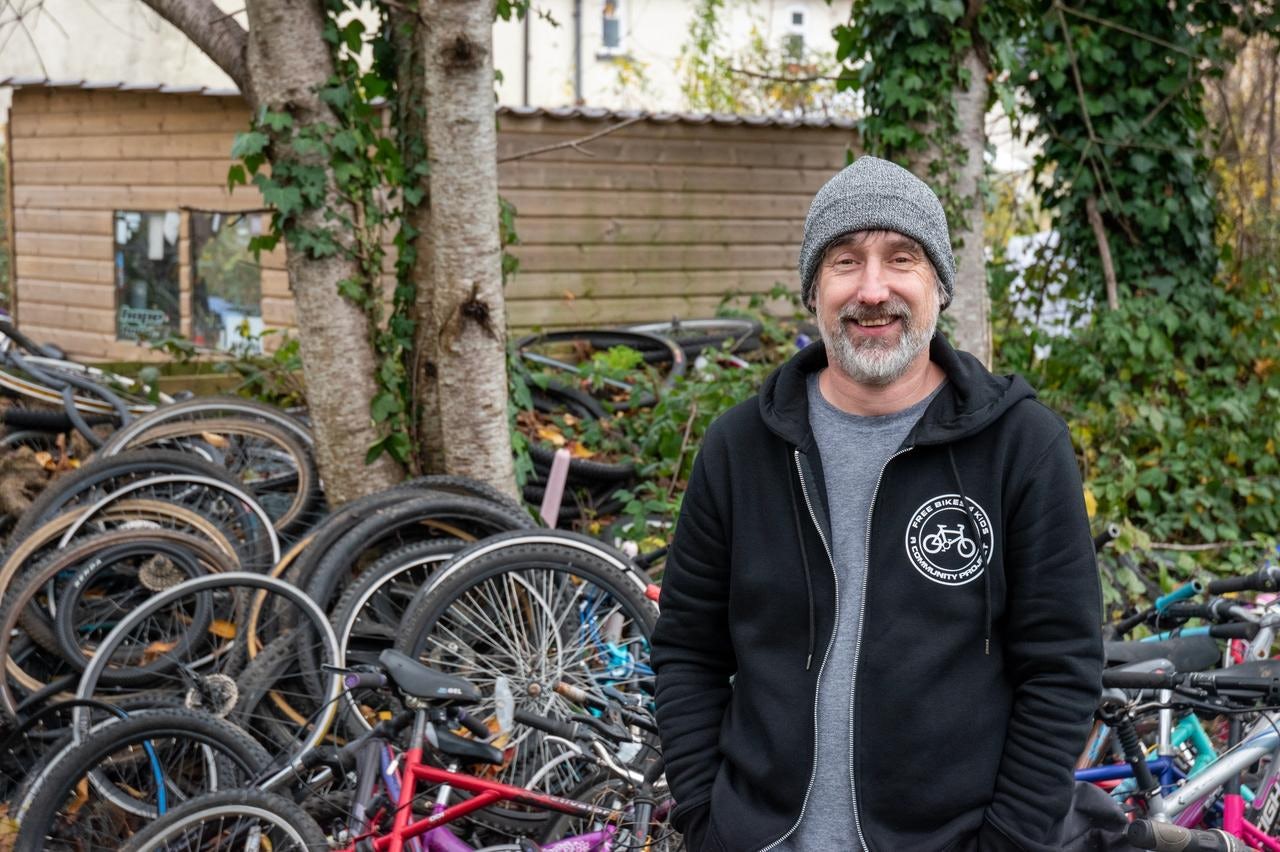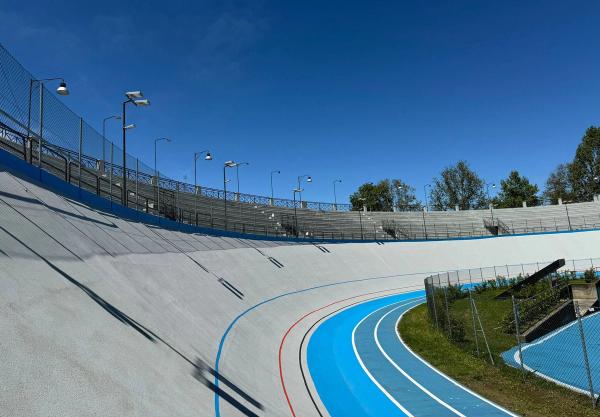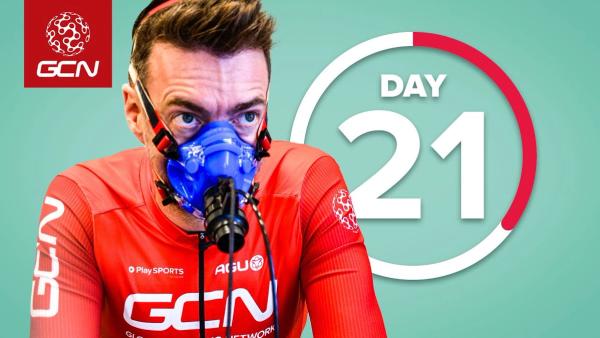3,000 bikes and counting: The one-man mission to get kids on bikes for free
When he's not caring for his wife, Mike Jones fixes bikes and gives them away, free of charge. GCN pays him a visit at his centre of operations: a small garden shed behind his house in Newport, Wales
James Howell-Jones
Junior Writer
© GCN
Mike Jones in his garden
Mike Jones has turned an incredibly difficult set of circumstances into a chance to do good. Five years ago, Jones’ wife Rachael suffered a neurological episode that left her in need of round-the-clock care, and Jones left his job to step up. Amid personal tragedy and struggling with his mental health as a full-time carer, he began helping his community. In spare moments between caring for Rachael, Jones fixed up bikes, which he gave away to anyone who needed one.
What started with one bike for his grandson has grown beyond imagination. Over a period of five years, Jones has fixed and given away over 3,000 bikes to children in his local area in South Wales, free of charge. Schools rely on him. Child services rely on him. And, as another Christmas approaches, parents, who otherwise would have nothing to put under the tree, rely on him.
It’s a colossal project. Old bikes and spare parts flood into Jones’ back garden, and every year, hundreds of functioning bikes roll out of his shed and into the local community. At the centre of it all is Jones, a modest, self-effacing man who insists “it’s all just happened to me, really.”
To learn more about the project, we visited the centre of operations: a small garden shed behind Jones’ house in Newport, Wales.
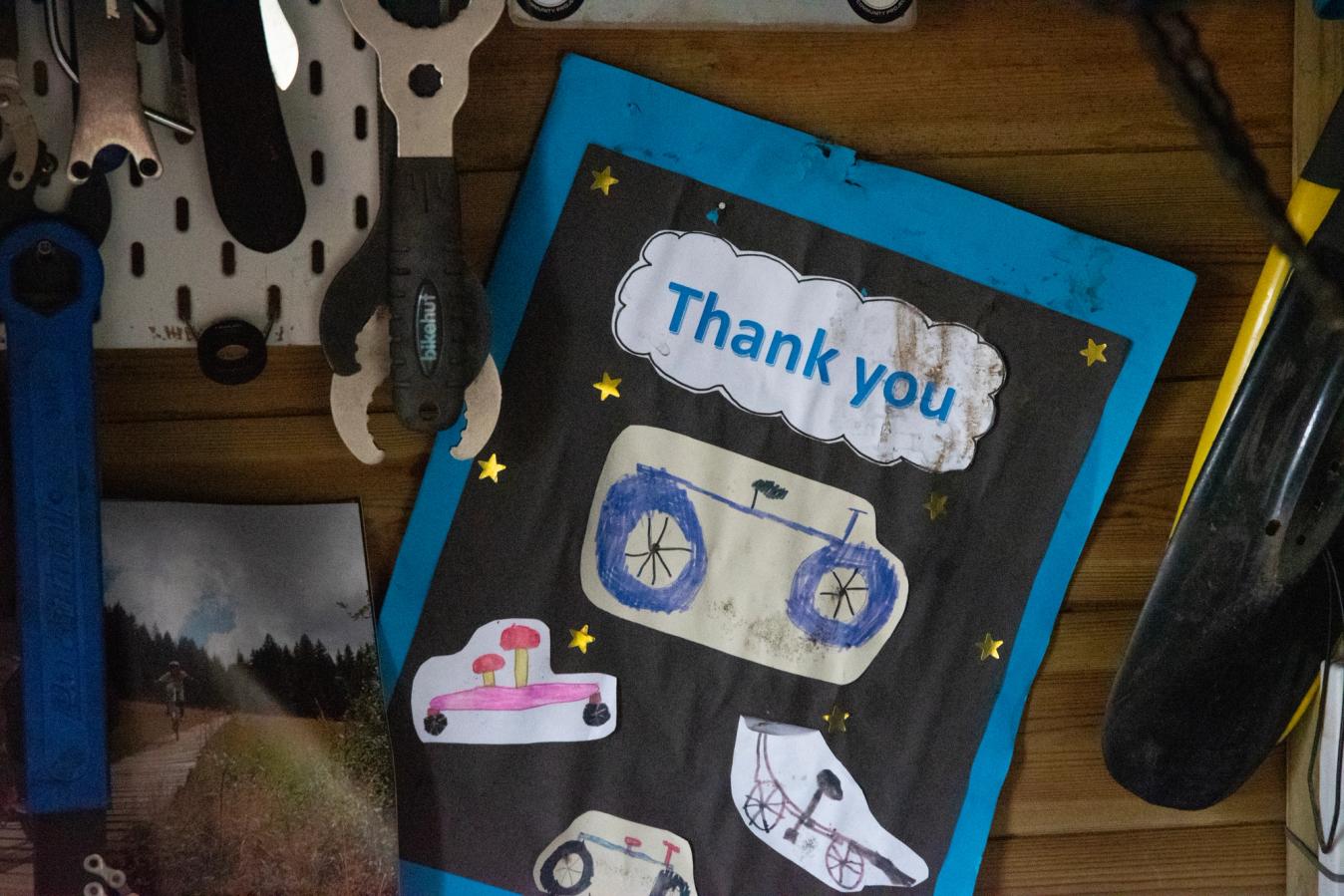
© GCN
A thank you card pinned up in Mike Jones' workshop
Origins of the Free Bikes 4 Kids project
Mike Jones held onto his IT job for three years after Rachael’s neurological episode but, in the end, balancing full-time employment and full-time care was impossible. He left behind the job he’d held for the past 23 years, and adjusted to life on the carer’s allowance – just £76 a week.
"We were a bit short of money, obviously, and I was looking for a bike for my grandson," Jones tells GCN. "And I went past a charity shop and saw one outside. I bought that for, I think it was three quid, a little 18-inch wheel bike, and fixed it up."
Jones shared what he’d done online, and messages from struggling parents started coming in, asking if he had any more refurbished bikes for their children. He could have simply said no, but Jones saw that the short periods of downtime between caring for Rachael were moments when he could help other people out.
It seemed like a chance to help himself, too. Jones was in his early 40s, years in which, he says, “you do a lot of self-reflection anyway, and I wasn't in a brilliant place.”
“When you're in your 40s and a major life change happens, like coming out of work, then you feel even more sorry for yourself and you start sinking,” he explains. “So it was either that or try and feel useful again.
“So I pulled a few more from charity shops. And then, once they'd gone, I thought, well, there's obviously something in this. So, I just started with Twitter primarily, and said, ‘anybody got any bikes in the back of their garage they don't use anymore? This is where to bring them and I'll pass them on – I'll fix them up and pass them on to kids that really need them.’
“And it's just absolutely exploded.”
Working at scale
At any one time, Jones has about 400 bikes spread between his back garden and two storage facilities lent to him by friends.
On a quiet week, he gives out five bikes. On a busy week, it’s 20, and on some occasions, as many as 40 per week. Jones has no difficulty finding deserving recipients for the refurbished bikes. Some go to individuals, some go to social services, and loads go to schools.
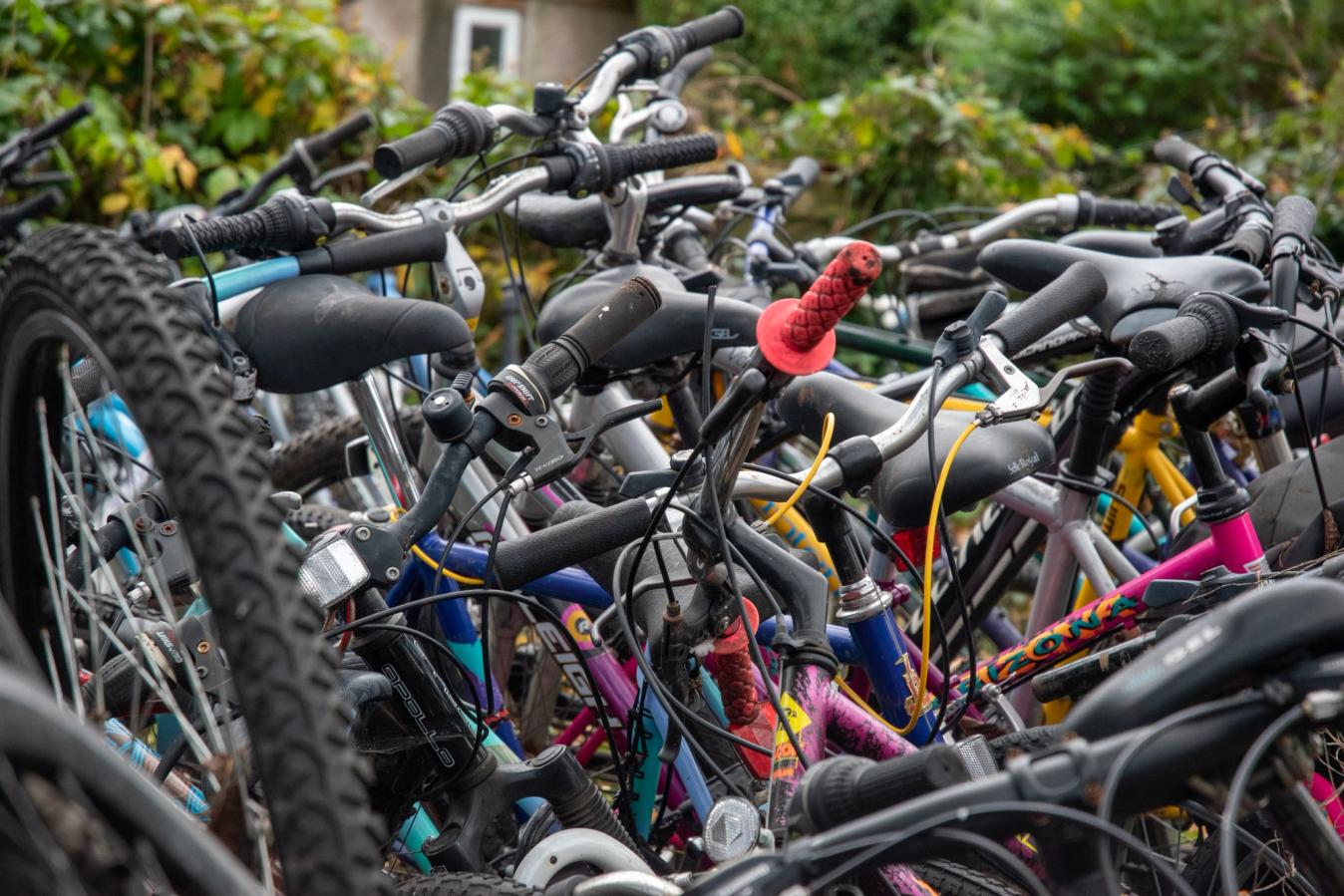
© GCN
Dozens of bikes piled down the end of Mike Jones' garden
"Anybody that sees my Twitter and my Instagram would contact me and say, ‘Look, this is our situation…’,” he explains.
There’s no means testing – it’s all based on trust – but Jones is confident that he has never given a bike to someone who didn’t need it.
"I go to these people’s houses to deliver the bikes and I see no carpet on the stairs, food bank boxes, and you don’t tell people you’re living like that unless you’re in that situation.
"I had bikes as a kid. I was lucky. I didn't realise I was lucky at the time. But now I do. When a 12-year-old comes to me and I'm explaining what gears are because he's never had a bike before, that's when you realise that you've done alright, growing up.”
As the project has become more established, Jones has begun working with child services to make sure the most needy children receive bikes.
“Now I'm so far in, I get social worker-referred families and I get child services. They're always in touch with me saying, ‘We've got this lad, who doesn't go to school anymore, he's a bit disconnected from everything. We think a bike would help him to get back into a routine.’
“A lot of the time these kids are in foster care. They've had to leave everything behind because of the domestic violence situation, and it's not just them having something back of their own, but it's that they can go where they want.
“It's a bit of freedom. It's a bit of respite, which is kind of what bike riding is for me.”
Finally, Jones gives bikes to local schools, who take batches of bikes and helmets each year.
“Schools will take 20 to 25 bikes at a time, and I give them helmets to go with the bikes as well, which come from the Principality Building Society.
“I'm in 24 schools at the moment. And I've got a list of about eight waiting already for next year.”
To be clear, the bikes Jones provides to schools are not loaners; they’re gifts.
“In some cases,” he says, “they’ll give them to the children, and the children take them home, so it’s their bike. And then the following year, I’ll give the school another load of bikes, and they’ll do it again.”
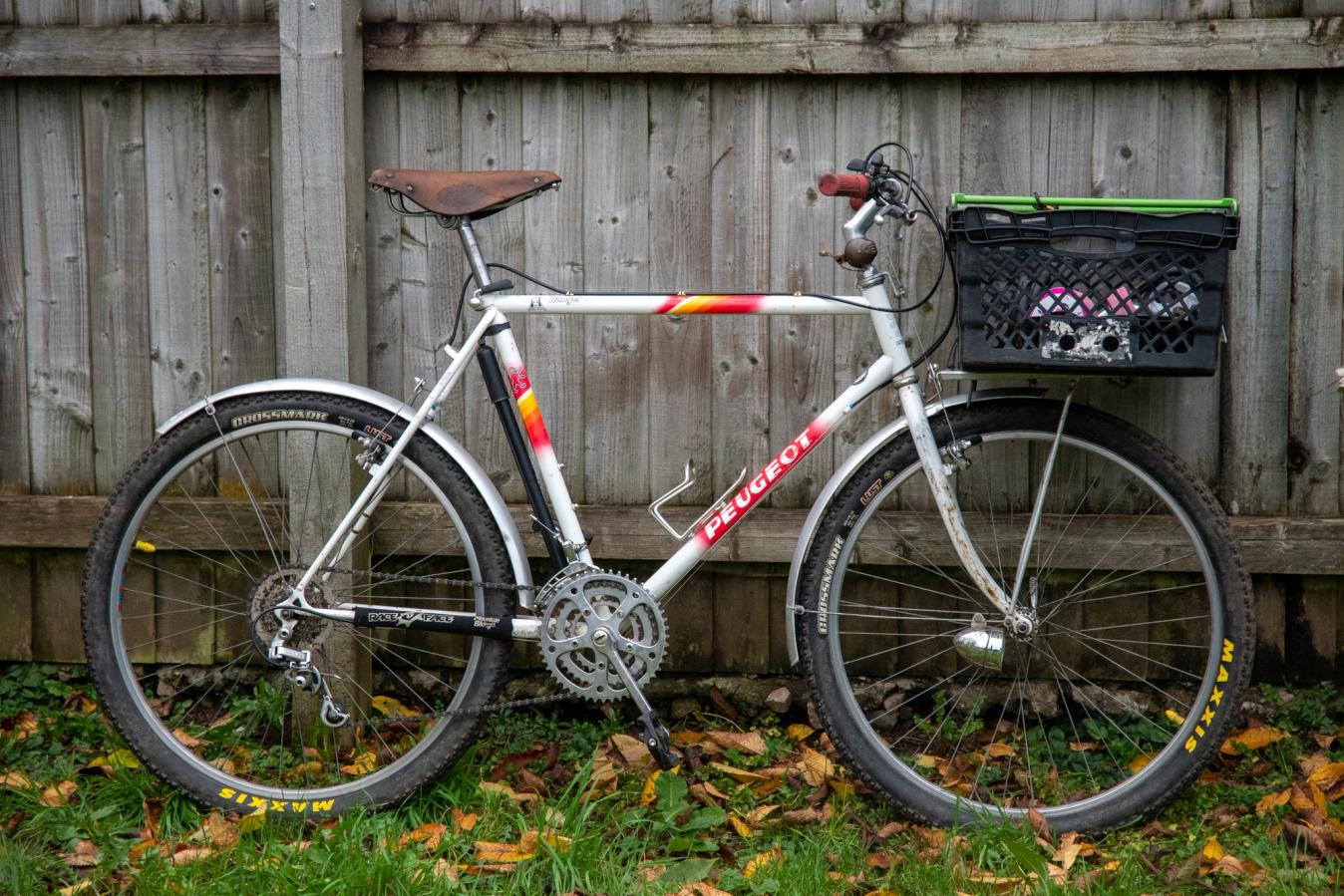
© GCN
Mike Jones' personal 'mobile mechanic' bike, which he uses to service bikes he's given to schools
A constant flood of donated bikes
Jones is widely known in the area, so the donated bikes now flow in faster than he is able to fix them.
“Even now, five years in, there's barely a day where somebody doesn't leave a bike outside the house. It's just a constant flow of bikes.
“It’s insane, honestly. It's nuts. I still can't believe it myself.”
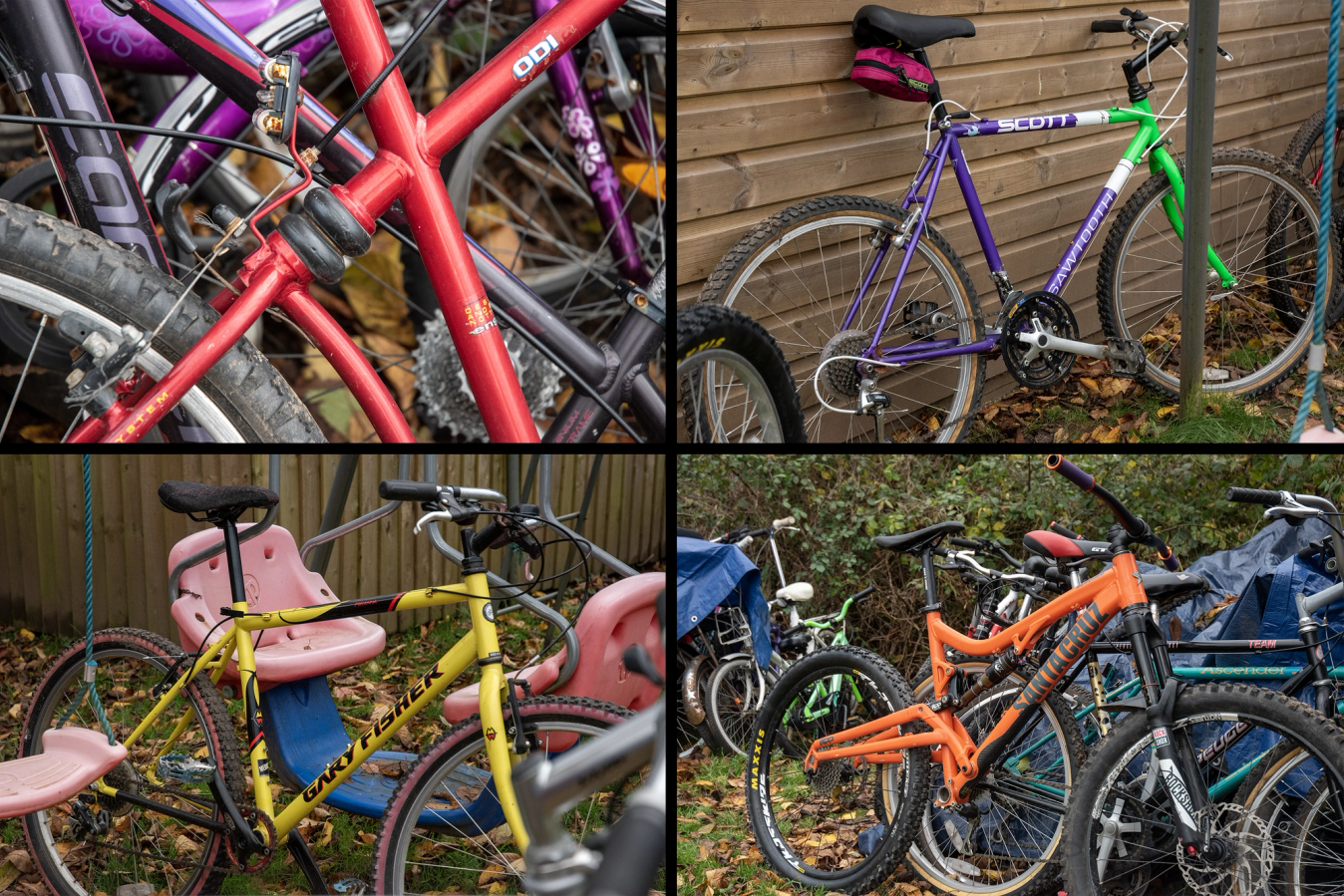
© GCN
A few tech highlights from Mike Jones' back garden
The quality of the donations ranges from knackered old beaters to outdated but high-end roadies.
Fans of vintage mountain bikes would have a field day in Jones’ garden, and indeed Jones pulled out a few of his personal favourites to show us. Among them, a mint condition Saracen, a Gary Fisher mountain bike, and a few iterations of 1990s Specialized Rockhoppers.
Jones knows the classics from the clunkers, and he makes sure the most special bikes get appropriate homes. Two carbon fibre road bikes, for example, donated by an ex-professional in the local area, are getting special attention from Jones, who has arranged to give them to a local cycling club.
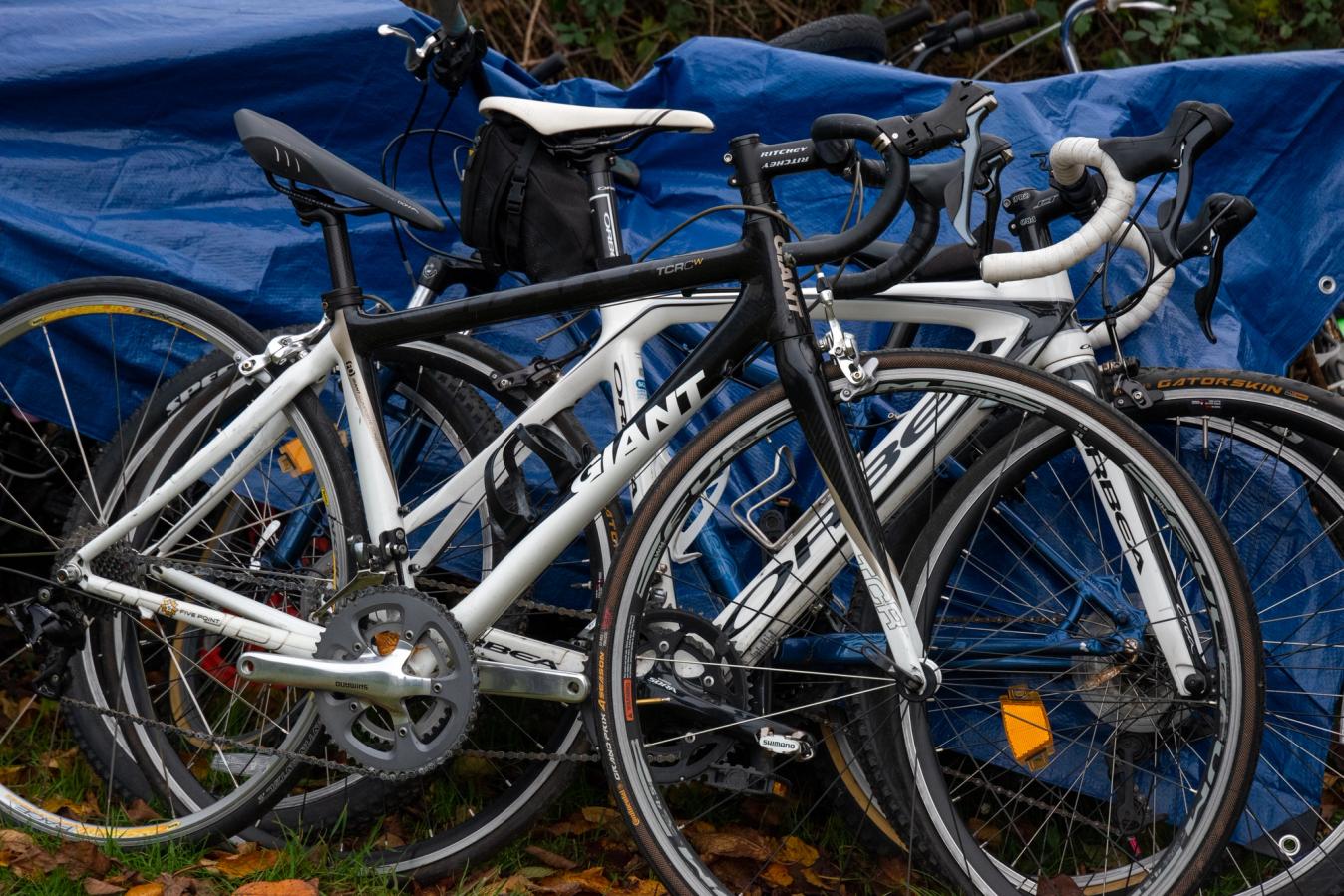
© GCN
Two carbon road bikes, headed for the local cycling club
But nothing is ever sold. Everything is given away for free. People tell Jones he should sell the vintage gems to pay to fix up more lower-end bikes, but that's an extra complication that he just doesn’t need.
“And I don’t want to see one of my bikes on eBay,” he reasons.
In terms of parts, Jones has a couple of ways of sourcing them. For the most part, they come from shed clear-outs. Jones is pleased to receive “stuff everybody just kind of holds on to," as he puts it.
“Which is why I've got a drawer full of front mechs there. You don't see them very often these days, do you?”
Then, there are the piles of bikes tucked away down the far end of Jones’ garden. “The graveyard,” as he calls it, where unserviceable bikes are harvested for parts – Jones jokes that he is an expert at shifting seized bolts and bearings.
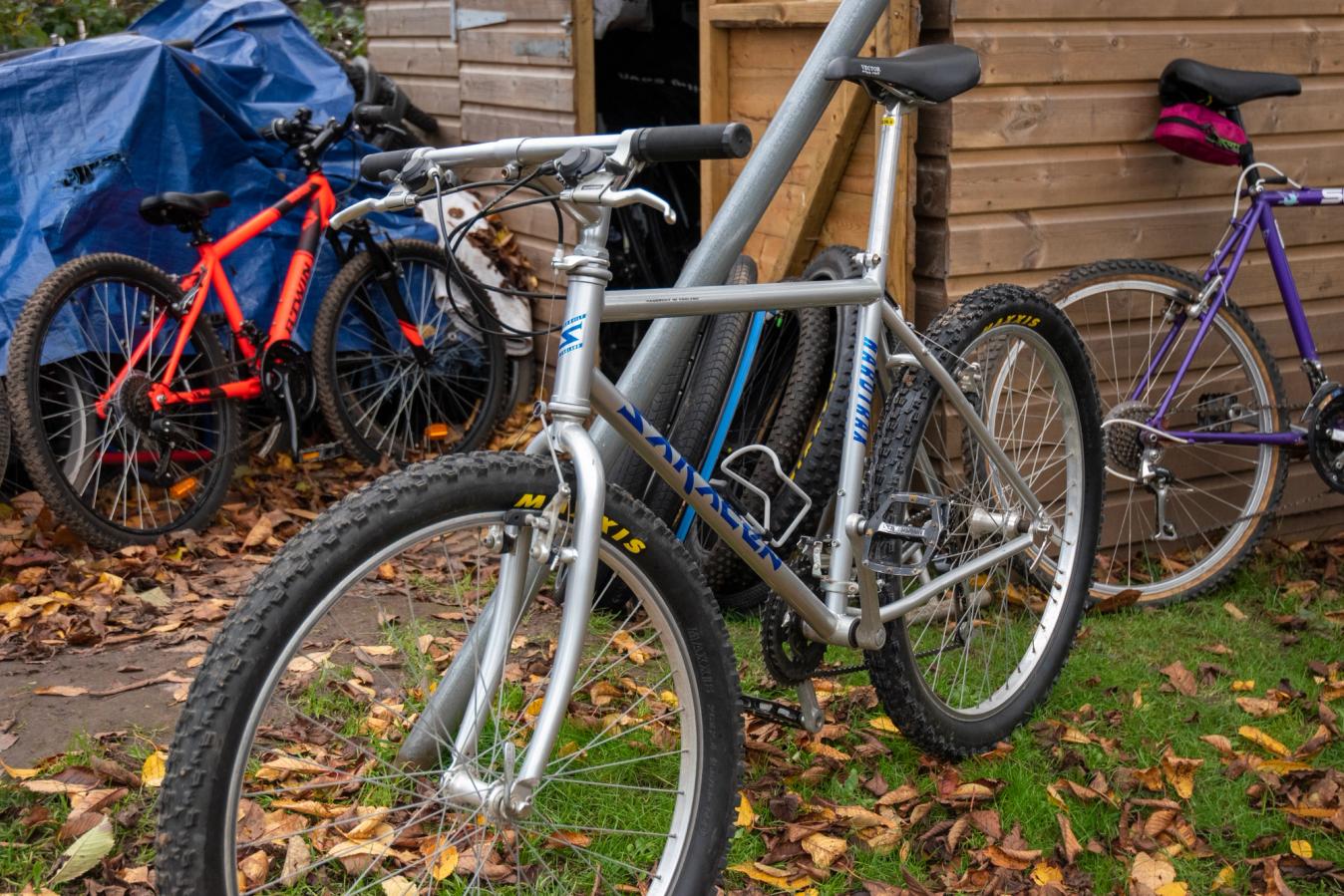
© GCN
A factory-fresh Saracen Hardtrax from 1997, ready to be given away
Working alone
With so many bikes flowing in, it might seem like Jones could benefit from a bit of assistance. Indeed, he says “loads of people have offered”. But he rejects all offers of help for fear of letting people down.
“The problem with that is, I never know from one day to the next what Rachael's health is going to be like,” he explains. “So if I said, right, I'll see you every Wednesday, come and do every Wednesday afternoon, I'm going to be letting that person down because we could be down in the hospital tomorrow.
“So it's more about not letting the person down, do you know what I mean?”
Jones’ working schedule does indeed sound difficult to predict. With Rachael’s chronic condition, he says they “practically live down at the hospital”. Even when at home, Jones is only able to work on the bikes during the short gaps between administering care.
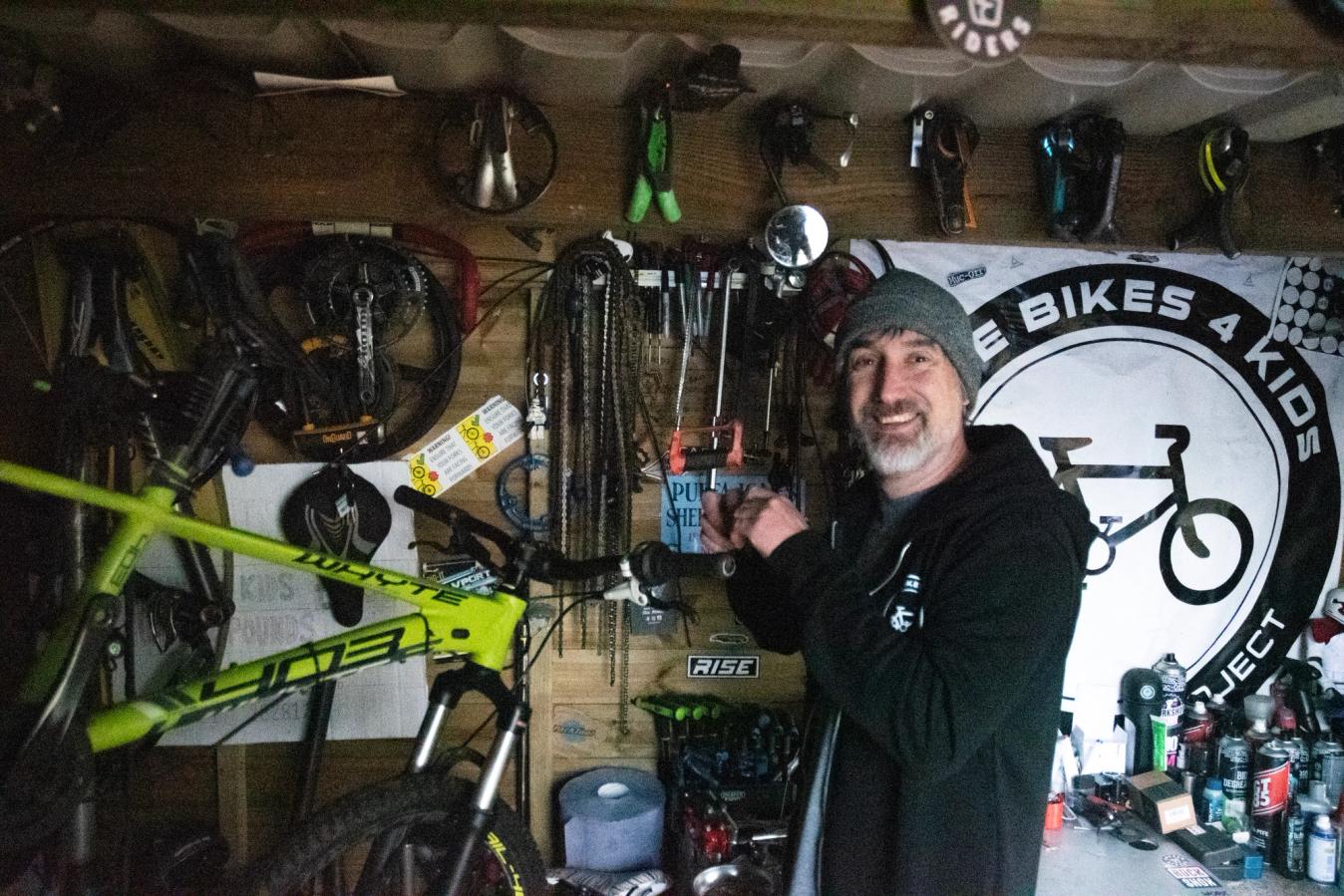
© GCN
Mike Jones in his shed, in which it's so dark that the camera struggles to expose the shot
“She'll take medicine at certain points of the day and she might sleep for a while, maybe two hours, so I just dive out here during those gaps, and that's that's how it works, really.”
At any rate, it would be difficult for a newcomer to navigate Jones’ workshop and garden. His garden is a sea of bikes in different states of disrepair.
His shed, unheated, uninsulated and unlit, is just about big enough for one bike and one mechanic. Every surface is covered in tools and parts.
“People say to me, ‘What's your system?’ Well, there isn't one.
"It's just rolled on. I've just kept making my lists, and doing what's on my lists. And the lists have just gradually gone longer and longer and longer, and that's just the way it is.”
A humble hero
Jones’ project has grown legs. “It’s snowballed,” as he puts it. “Every time I come out of Tesco's, practically, somebody will be stood next to the van, waiting for me and they'll either say, ‘Can you help my daughter, she's got these two five-year-olds and they've always wanted bikes’, or they'll say, ‘I've got a bike in my garage, I'll bring it to you later.’”
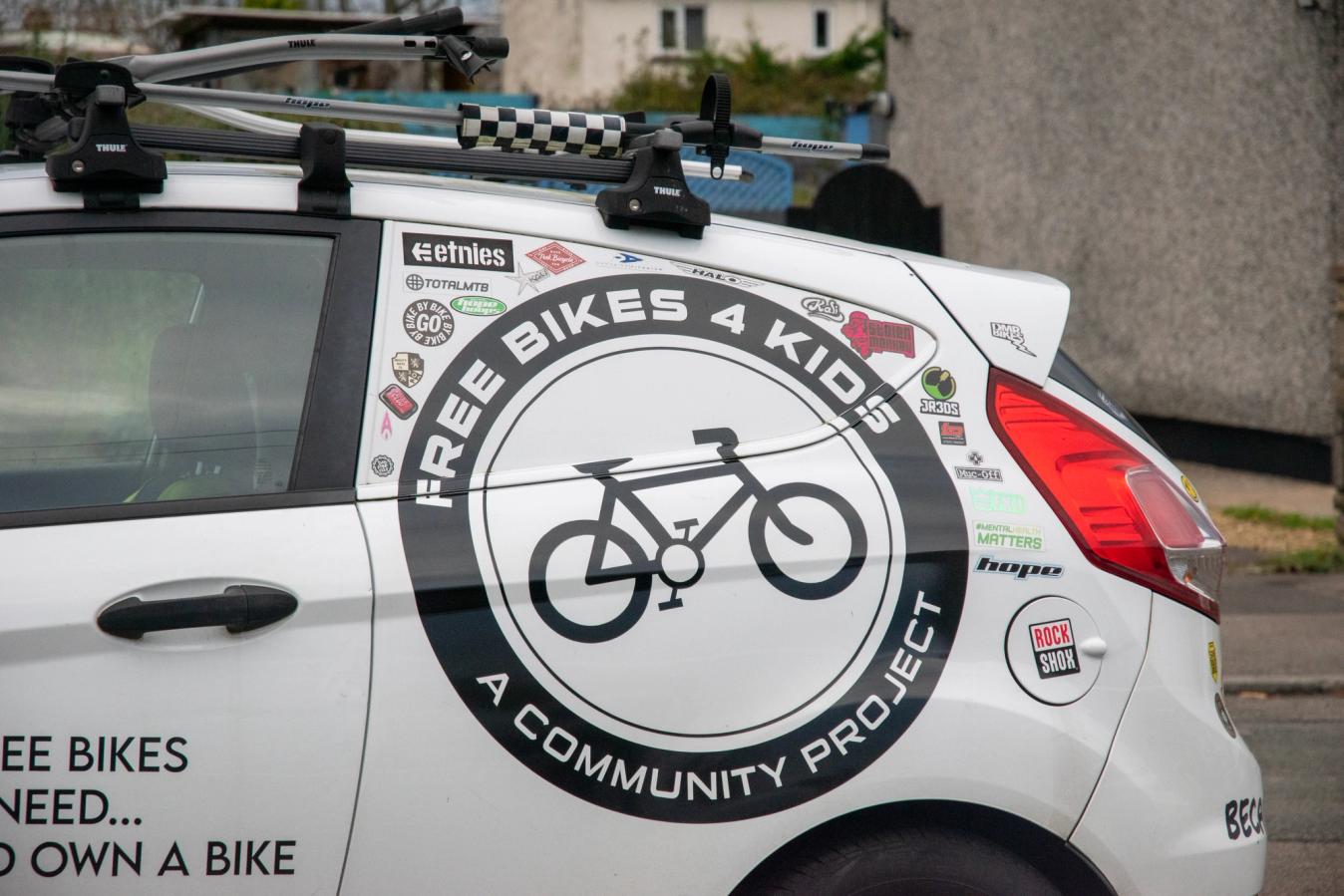
© GCN
Mike Jones' van – no wonder people stop him in Tesco's car park
He gives the impression that this project just rolls on powered by its own momentum. He wants you to think he’s just an incidental part of it, saying things like, “it's something I would have been doing anyway, in as much as tinkering with my own bikes” or “I'm just piecing things together and passing them on”.
The truth is that there is nothing incidental about the countless hours of voluntary work Jones has put into this project. He works tirelessly; his own road bike is buried, collecting dust beneath a pile of bikes for the project. No matter how many donations he receives, Jones is the creator and sustainer of this network of generosity.
It started as a way to fill the spare moments between caring for Rachael, as a way to help his own mental health, but Jones’ project has grown to become something like a one-man social service. It makes you realise just how much good one person can do in the world, and how much more the rest of us could do.
You can support Mike Jones' project by donating to his GoFundme, or by sending him bikes or parts. Contact him via X (Twitter) at @PuffaJones.
